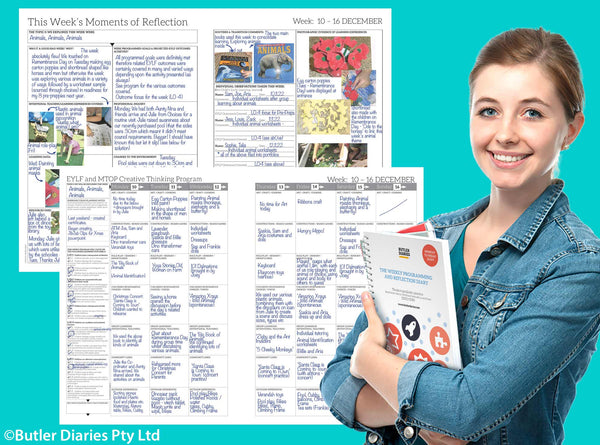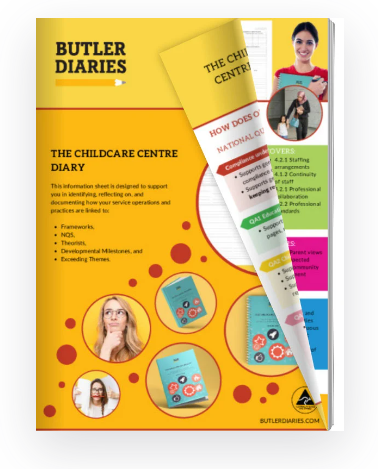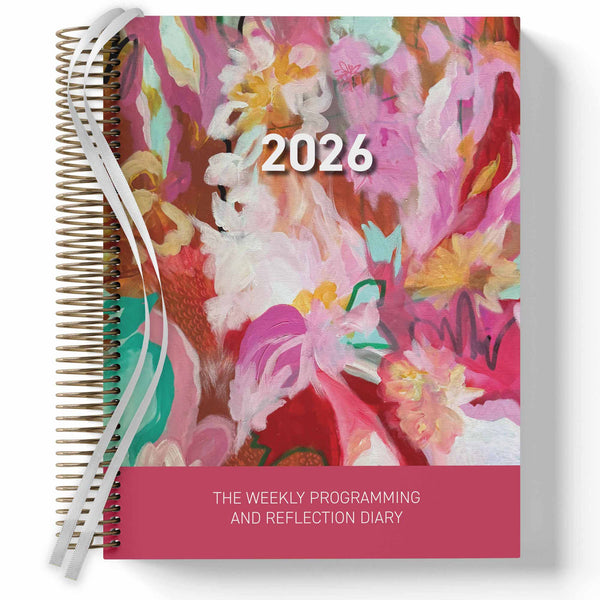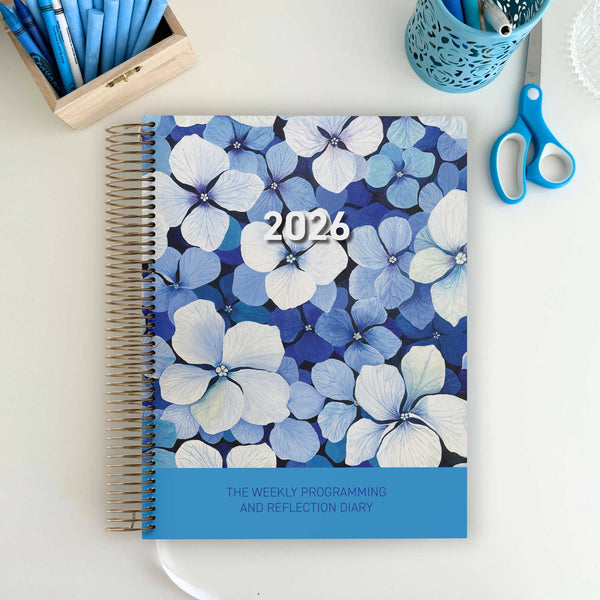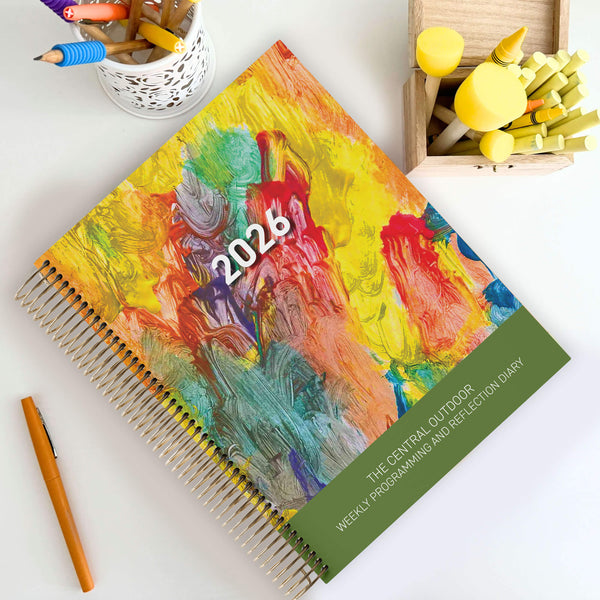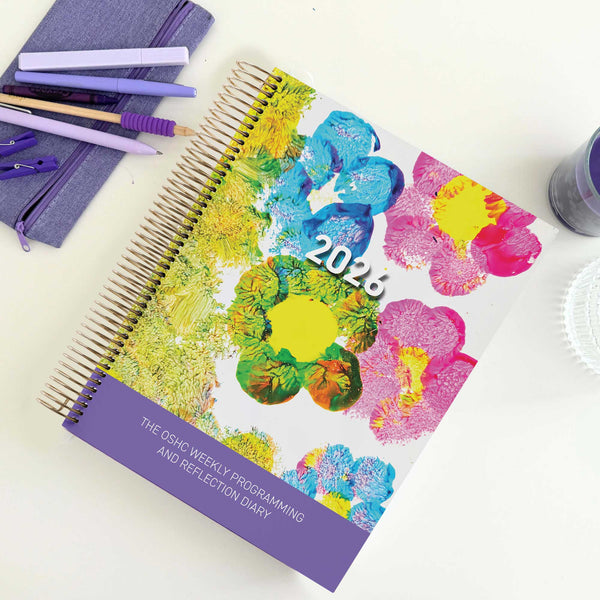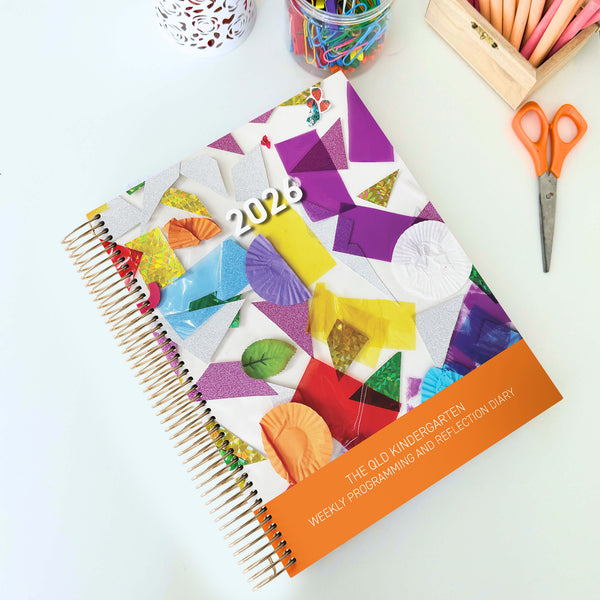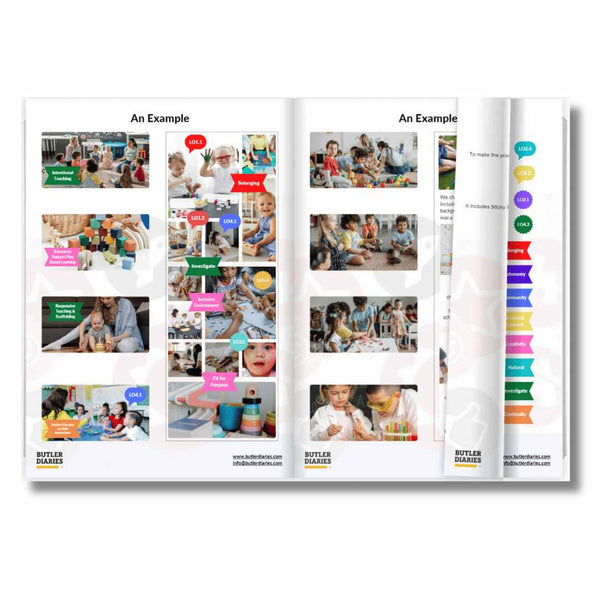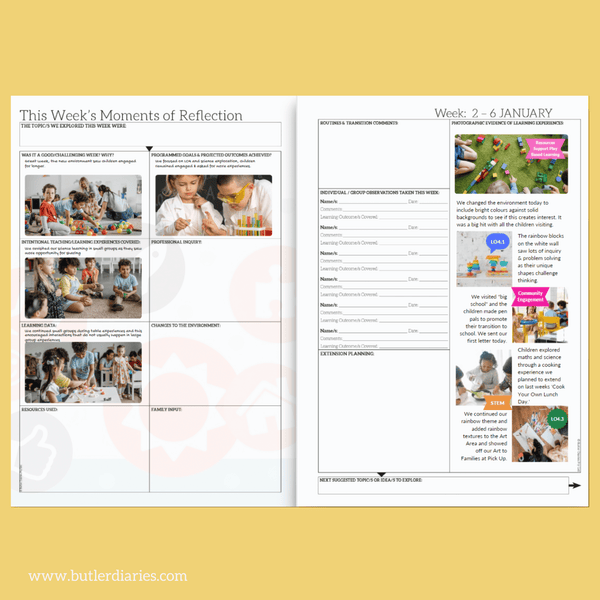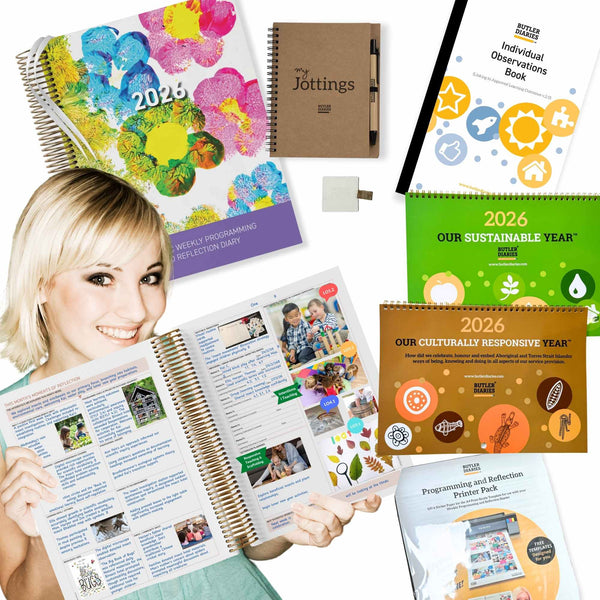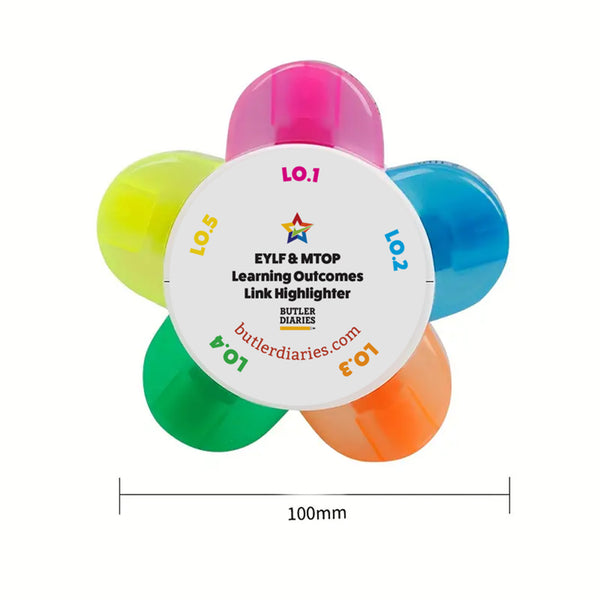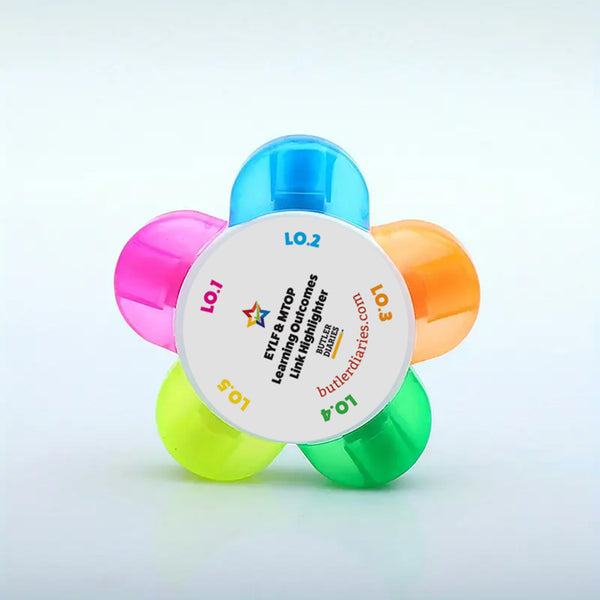"I don't know where it has been all my life."
Leanne is a veteran Educator in the industry for nearly 40 years. As a relief worker, she visits many centres with different philosophies and practices. When asked about her practice and method, "how did you do this? Or how did you set that up", she points to the Butler Method supporting her in her programming and practice.
When she was first introduced to the Butler Method she was unsure how it would work or how to approach it. After trailing the Weekly Programming and Reflection Diary in practice, she was amazed at how well it worked and just how simple it was to use, sharing, "I don't know where it has been all my life".
"It's doing your work for you. That's all we keep saying, it's doing your work."
Simply and Easy to Use
"At first, it was like, oh my god, what are we going to do? How's it going to work?"
Leanne felt the way many of us do when faced with the idea of trying to make changes. We get used to our way of doing things and change can feel intimidating. However, as educators we are encouraged to critically reflect on our practices and decision making to ensure continuous quality improvement. Leanne did just that.
"It's just so hard to describe but it's made my job a lot easier." "Last year was such a breeze for us!"
Leanne feels the Butler Method has simplified her documentation and helped her meet her obligations. She has described the diary as doing her work for her.
"At the end of the day, we've already written in your book. So that's the way we do it. We have a table in our room next to our sign in book and the book is open for a week. Throughout the day, we all just go over and write [our experiences in it]. By the end of the day, it is full so when they've gone home at four o'clock we go to sit down and we go, Oh, it's done"
Programming can feel like it takes away so much of your day and keeps you from spending time with children... the reason we entered this industry in the first place! The Butler Method was specifically designed to remove this barrier, keep you engaging with children, all while meeting your documentation requirements.
"It's no different sheets of paper. You're not chasing around and looking for stuff here, there, and everywhere. It's all together in one step there."
This has supported Leanne in collaborating with staff and the service as a whole and has provided an indispensable tool for assessment and rating.
Assessment and Rating
"The department came to give us A&R and they were so impressed with it." "They could see everybody was involved in it and every person that worked there had written something."
Leanne has experienced more than one assessment and rating using Butler Diaries and has shared how she consistently receives positive feedback on how the idea is showing staff collaboration and consistent practices.
At another service, "I convinced them and then they got assessed and the assessor says, "oh god, this book" and we'd only been doing it you know, a month and a half"
All Butler Diaries have been carefully designed to have regulations and compliance at their core. We have recently created Compliance eBooks that can be downloaded on the product pages. Head to the Diary's product page, and you can download the Compliance eBook from the 'What's Inside' tab. You can download the Weekly Programming and Reflection Diaries' Compliance eBook here.
Improving Environments and Practice
When trialling the diary at a service for two weeks, Leanne spoke to a room leader about how the diaries help you improve the environment, learning experiences, and your practice as an educator.
Looking at the past fortnight, Leanne asked, "Where's the home corner written in?", and the educator responded, "It isn't". Leanne used this opportunity to show how the Butler Method is showing this environment is not creating learning opportunities for the children. "The kids are not interested in it. Now this book has done your programming for you, because you've seen all the kids, things that the kids like, things that they're doing. Now you can learn from that, get rid of home corner for something else."
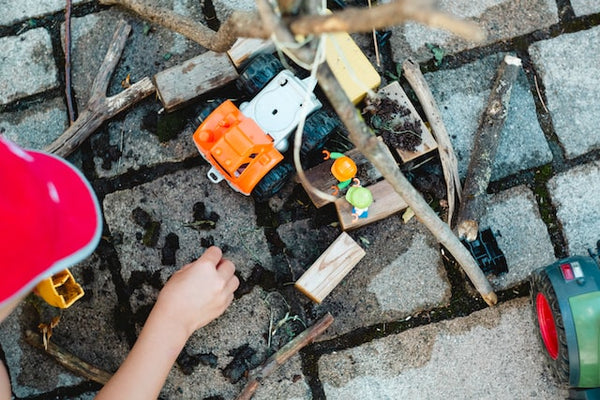
Butler Diaries have designed our diaries to do just that. Show exactly what is happening in your room and act as a tool that enables reflective conversations between staff. This conversation then gets recorded under Environment Changes in the Weekly Programming and Reflection Diary and shows your critically reflective practice and learning assessments.
Staff Collaboration and Consistent Practice
The Butler Diaries promotes staff collaboration in more than one way. It supports your rooms and service in consistent practice.
"I come in and go hey, I didn't see you doing the planes, but I know it's been done. And then they'll say to me, I didn't know that story was read and I'll go no, because you were outside and I was reading it inside. So you get a whole picture of the group and the day because of being long days, you do miss things. So by having your book there and everybody writing in it, you get a whole picture of what has happened today."
This simple method is also why the Butler Method reduces the time spent on your paperwork. It is designed for collaboration and communication, even when you are not in the same space or when a staff member is away. Leanne worked with a lead educator who was very particular about her style of programming and was unsure about making the change to the Butler Method.
"[The lead educator] went away for three weeks to Japan. And I wrote everything in the book and when she came back and she read it and she said to me the next day I can see how good that book is. I understand now, she said, because I can see why you did something and where it led to. And I can see in the book what has happened and I can see how you've introduced things because of what the children have actually said or the parents have said it's brilliant."

In simplifying the documentation process, Butler Diaries has found that the reasoning behind your decision making can be captured along with the evidence. It gives the perfect snapshot of children's learning and what is happening in the room, and importantly, why.
This is supported in two ways by the Weekly Programming and Reflection Diary, the first by the weekly Programming Spread that captures what is happening in the room and how the experiences are linking together. And second, the weekly Reflection Spread prompts you to reflect on the experiences and learning captured in the Program and critically reflect on why these decisions were made and what could be improved.
Leanne and her co-workers have then used the additional Reflection page at the end of the month as a "wellbeing" page.
"You write what you want to write as your reflection for the month. You can even write how you've had a crap time over the weekend. So I wrote you know, it was a bad month and I didn't like this but I enjoyed you know, the excursion or something. The next person wrote their own thing. And it was really good to do because it was a way you could read each other's stuff so you knew that your co worker might have been having a bad day or might have been having a really good time in the last week or something affected them. You may not have picked it up while you were working, but it's in the book. And you tend to write things rather than say things. I'd write I was having a hard time using the computer and my co-worker would come up and go I'll do your computer work today. Can you do my other work that you're good at? So it was a way of tackling things without having to actually speak as well. We still spoke we're very close. Don't get me wrong, but it is that little bit easier to write what we actually felt rather than trying to say it to somebody's face."
It can be hard to reach out when something is difficult or stressful and it can be especially difficult to have a conversation with everything that happens throughout our busy days. This helps educators remain connected and support one another in the wonderful work they do. Allowing them to support each other in their weaknesses and shine in their strengths.
This added collaboration stretches to the families too, improving partnerships between families and their services.
Family Partnerships
Leanne described our busy day perfectly, you may get a message at the door on drop off and with so much going on and so much to do, the message may not get passed along to every teacher and a child could potentially miss out on an opportunity to learn or revisit their experience.
"You don't get a chance to go around to each member of the room to make sure they were told [the family input] all the time. I tend to try to get to the teacher and say, Look, this mom said this to me, but sometimes I don't get to my fellow co-worker, because you get side-tracked with other activities to do. And so everybody gets to hear that feedback and see what's going on[when written in parent input section]."
We know well how important partnerships with families are in providing children the best learning opportunities and environment possible. The Family Input section gives staff the power of communicating family messages across busy days and when staff are away or on rotating shifts. This input can not only be incorporated into your programming but in your service's practice as a whole.
"Parents comment are in it so then it just goes straight into our QIP [from the] family input section. We just write what the parents say to us at the door and then once a month when we have our staff meetings, we just go and add it to the QIP. We grab your book now and go yes, that parent donated this, this parent gave us feedback here."
Training and Upskilling Staff
After the Butler Method completely changed her experience working in Early Childhood, Leanne is now a strong advocator. She uses the diaries to complete examples and show her fellow educators how simple it is and how it can increase staff collaboration, stronger relationships with staff and families, and improve learning experiences for children.
"I show every student. Every student we have that comes in and do their placements, I keep telling them buy this book." Leanne believes it is the perfect way to train staff to document their programming and practice.

With her vast experiences with teachers and educators with different teaching styles, Leanne has found the Butler Diaries helps bring consistency of practice and provide evidence for why teaching decisions are made.
You can access an eBook resource to support you in using the Weekly Programming here, or you can read this blog for more tips. We also have visual examples of the Weekly Programming and Reflection Diary in action here.
A Word from Butler Diaries
We thank you Leanne and love how passionate you are about the industry. Your desire to not only give, but advocate, for consistent practice and ongoing quality improvement is inspiring!



